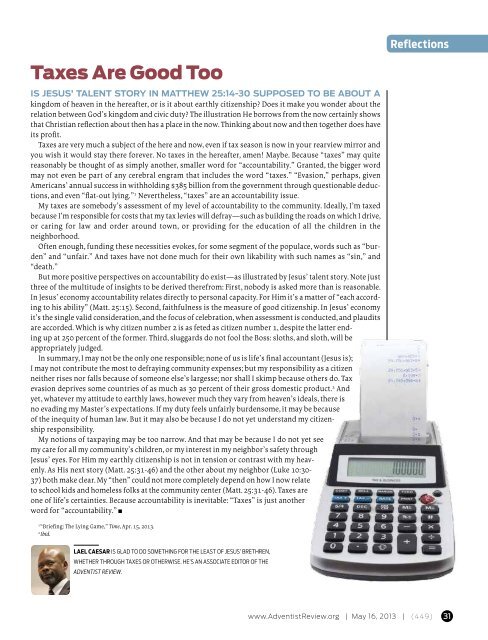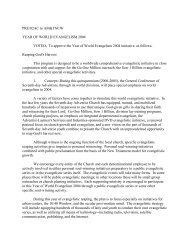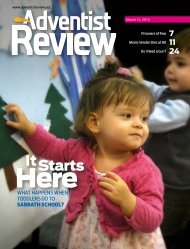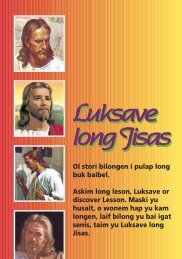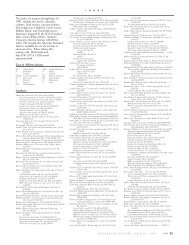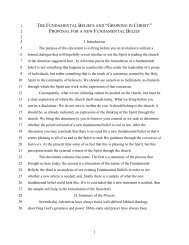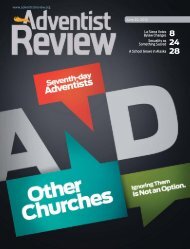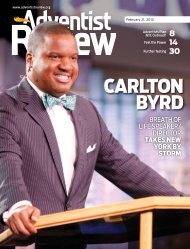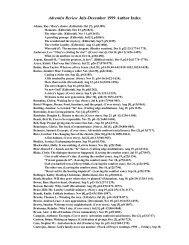Christ Kona?
Download PDF - Adventist Review
Download PDF - Adventist Review
- No tags were found...
You also want an ePaper? Increase the reach of your titles
YUMPU automatically turns print PDFs into web optimized ePapers that Google loves.
Reflections<br />
Taxes Are Good Too<br />
Is Jesus’ talent story in Matthew 25:14-30 supposed to be about a<br />
kingdom of heaven in the hereafter, or is it about earthly citizenship? Does it make you wonder about the<br />
relation between God’s kingdom and civic duty? The illustration He borrows from the now certainly shows<br />
that <strong>Christ</strong>ian reflection about then has a place in the now. Thinking about now and then together does have<br />
its profit.<br />
Taxes are very much a subject of the here and now, even if tax season is now in your rearview mirror and<br />
you wish it would stay there forever. No taxes in the hereafter, amen! Maybe. Because “taxes” may quite<br />
reasonably be thought of as simply another, smaller word for “accountability.” Granted, the bigger word<br />
may not even be part of any cerebral engram that includes the word “taxes.” “Evasion,” perhaps, given<br />
Americans’ annual success in withholding $385 billion from the government through questionable deductions,<br />
and even “flat-out lying.” 1 Nevertheless, “taxes” are an accountability issue.<br />
My taxes are somebody’s assessment of my level of accountability to the community. Ideally, I’m taxed<br />
because I’m responsible for costs that my tax levies will defray—such as building the roads on which I drive,<br />
or caring for law and order around town, or providing for the education of all the children in the<br />
neighborhood.<br />
Often enough, funding these necessities evokes, for some segment of the populace, words such as “burden”<br />
and “unfair.” And taxes have not done much for their own likability with such names as “sin,” and<br />
“death.”<br />
But more positive perspectives on accountability do exist—as illustrated by Jesus’ talent story. Note just<br />
three of the multitude of insights to be derived therefrom: First, nobody is asked more than is reasonable.<br />
In Jesus’ economy accountability relates directly to personal capacity. For Him it’s a matter of “each according<br />
to his ability” (Matt. 25:15). Second, faithfulness is the measure of good citizenship. In Jesus’ economy<br />
it’s the single valid consideration, and the focus of celebration, when assessment is conducted, and plaudits<br />
are accorded. Which is why citizen number 2 is as feted as citizen number 1, despite the latter ending<br />
up at 250 percent of the former. Third, sluggards do not fool the Boss: sloths, and sloth, will be<br />
appropriately judged.<br />
In summary, I may not be the only one responsible; none of us is life’s final accountant (Jesus is);<br />
I may not contribute the most to defraying community expenses; but my responsibility as a citizen<br />
neither rises nor falls because of someone else’s largesse; nor shall I skimp because others do. Tax<br />
evasion deprives some countries of as much as 30 percent of their gross domestic product. 2 And<br />
yet, whatever my attitude to earthly laws, however much they vary from heaven’s ideals, there is<br />
no evading my Master’s expectations. If my duty feels unfairly burdensome, it may be because<br />
of the inequity of human law. But it may also be because I do not yet understand my citizenship<br />
responsibility.<br />
My notions of taxpaying may be too narrow. And that may be because I do not yet see<br />
my care for all my community’s children, or my interest in my neighbor’s safety through<br />
Jesus’ eyes. For Him my earthly citizenship is not in tension or contrast with my heavenly.<br />
As His next story (Matt. 25:31-46) and the other about my neighbor (Luke 10:30-<br />
37) both make clear. My “then” could not more completely depend on how I now relate<br />
to school kids and homeless folks at the community center (Matt. 25:31-46). Taxes are<br />
one of life’s certainties. Because accountability is inevitable: “Taxes” is just another<br />
word for “accountability.” n<br />
1<br />
“Briefing: The Lying Game,” Time, Apr. 15, 2013.<br />
2<br />
Ibid.<br />
LAEL CAESAR is glad to do something for the least of Jesus’ brethren,<br />
whether through taxes or otherwise. He’s an associate editor of the<br />
Adventist Review.<br />
www.AdventistReview.org | May 16, 2013 | (449) 31


